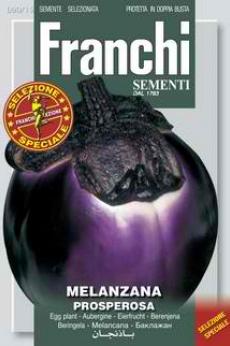
Eggplant Melanzana Prosperosa
Eggplant Melanzana Prosperosa Mid-early. This is a Franchi Special Selection and is a good producer with very attractive, large, round fruit in shades of purple but pure white under the brackts at the stem. Tastes as good as it looks with white flesh, small seeds and a texture reminiscent of mushrooms.. Large round fruit. White on the top, pink to purple on bottom. Beautiful and tastes as good as it looks. 70-80 days. 3 grams about 600 seeds
Prosperosa eggplants, botanically classified as Solanum melongena, are an Italian heirloom variety that belongs to the Solanaceae or nightshade family. Also known as Melanzana Prosperosa, the round fruits are one of the most cultivated varieties in Italy and are a highly regarded culinary ingredient for their large size and mild flavor. Prosperosa eggplants are commonly used by high-end Italian chefs, purchased through specialty growers, but the variety is also a favorite eggplant traditionally grown in local Italian home gardens. Eggplants have been a part of Italian cuisine since the 9th century
Prosperosa eggplants are best suited for cooked applications such as grilling, baking, frying, steaming, and stir-frying. The variety can be used for any recipe calling for common purple eggplant and is often chopped and tossed into soups, curries, and stews, hollowed and stuffed with grains, vegetables, and ground meats, fried and covered in tomato-based sauces, or grilled as a savory side dish. Prosperosa eggplants can also be cooked and mixed into pasta, blended into dips, sliced and layered into gratins, or baked into dishes such as ratatouille. In Italy, Prosperosa eggplants are commonly incorporated into caponata, which is a vegetable-based dish that can be served hot or cold as an appetizer, often spooned over toasted bread. Prosperosa eggplants pair well with fresh herbs such as basil, parsley, oregano, and coriander, cheeses such as parmesan, mozzarella, burrata, and cheddar, pine nuts, celery, tomatoes, zucchini, bell pepper, rice, pasta, and meats such as poultry, fish, turkey, and beef. The fresh eggplants will keep up to ten days when stored whole and unwashed in a plastic bag in a cool, dark place such as the refrigerator.
In Italy, Prosperosa eggplant is a favored variety for use in parmigiana, which is a traditional dish that has been made for over two hundred years. First appearing in printed form in 1837 in Naples, the classic parmigiana recipe consists of thick slices of fried eggplant served with baked cheeses and tomato sauce. Parmigiana began in Southern Italy but quickly spread to other regions, and with its introduction, many variations of the recipe were created depending on the local ingredients available on hand. In the modern-day, parmigiana has also become popular throughout the rest of Europe and the United States. Known as eggplant parmesan in the United States, the savory dish is a favorite meal served at Italian restaurants across the country, and many Italian-American households also traditionally make the meal as a meatless dinner once a week
